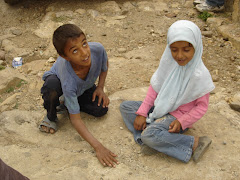
The Center for Public Integrity has compiled a searchable (by keyword) database of false statements made by the Bush Administration in the lead-up to the war in Iraq. A grand total of 935 - here are some highlights:
* On August 26, 2002, in an address to the national convention of the Veteran of Foreign Wars, Cheney flatly declared: "Simply stated, there is no doubt that Saddam Hussein now has weapons of mass destruction. There is no doubt he is amassing them to use against our friends, against our allies, and against us." In fact, former CIA Director George Tenet later recalled, Cheney's assertions went well beyond his agency's assessments at the time. Another CIA official, referring to the same speech, told journalist Ron Suskind, "Our reaction was, 'Where is he getting this stuff from?' "
* In the closing days of September 2002, with a congressional vote fast approaching on authorizing the use of military force in Iraq, Bush told the nation in his weekly radio address: "The Iraqi regime possesses biological and chemical weapons, is rebuilding the facilities to make more and, according to the British government, could launch a biological or chemical attack in as little as 45 minutes after the order is given. . . . This regime is seeking a nuclear bomb, and with fissile material could build one within a year." A few days later, similar findings were also included in a much-hurried National Intelligence Estimate on Iraq's weapons of mass destruction — an analysis that hadn't been done in years, as the intelligence community had deemed it unnecessary and the White House hadn't requested it.
* In July 2002, Rumsfeld had a one-word answer for reporters who asked whether Iraq had relationships with Al Qaeda terrorists: "Sure." In fact, an assessment issued that same month by the Defense Intelligence Agency (and confirmed weeks later by CIA Director Tenet) found an absence of "compelling evidence demonstrating direct cooperation between the government of Iraq and Al Qaeda." What's more, an earlier DIA assessment said that "the nature of the regime's relationship with Al Qaeda is unclear."
* On May 29, 2003, in an interview with Polish TV, President Bush declared: "We found the weapons of mass destruction. We found biological laboratories." But as journalist Bob Woodward reported in State of Denial, days earlier a team of civilian experts dispatched to examine the two mobile labs found in Iraq had concluded in a field report that the labs were not for biological weapons. The team's final report, completed the following month, concluded that the labs had probably been used to manufacture hydrogen for weather balloons.
* On January 28, 2003, in his annual State of the Union address, Bush asserted: "The British government has learned that Saddam Hussein recently sought significant quantities of uranium from Africa. Our intelligence sources tell us that he has attempted to purchase high-strength aluminum tubes suitable for nuclear weapons production." Two weeks earlier, an analyst with the State Department's Bureau of Intelligence and Research sent an email to colleagues in the intelligence community laying out why he believed the uranium-purchase agreement "probably is a hoax."
* On February 5, 2003, in an address to the United Nations Security Council, Powell said: "What we're giving you are facts and conclusions based on solid intelligence. I will cite some examples, and these are from human sources." As it turned out, however, two of the main human sources to which Powell referred had provided false information. One was an Iraqi con artist, code-named "Curveball," whom American intelligence officials were dubious about and in fact had never even spoken to. The other was an Al Qaeda detainee, Ibn al-Sheikh al-Libi, who had reportedly been sent to Eqypt by the CIA and tortured and who later recanted the information he had provided. Libi told the CIA in January 2004 that he had "decided he would fabricate any information interrogators wanted in order to gain better treatment and avoid being handed over to [a foreign government]."

No comments:
Post a Comment